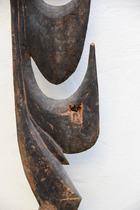Figure rituelle à crochets "yipwon" ou "kamanggabi" · Papouasie-Nouvelle-Guinée - Haut Korewori (Karawari), peuple Alamblak · ID: 3045250
Description
wood, pigments, shell disc eyes (one missing), rep.
The “yipwon” figure is an example of the perfect reduction of a form to its’ essentials. Head and foot, the idea of a body structure and a reference to the heart and lungs as a centre of life.
In Yimar mythology, the “yipwon” were spirits who arose from wood chips left from the carving of the primordial slit drum. They were known as the “children of the sun”. However, after murdering a relative of the sun, they fled inside the men’s house, turning themselves into the skeletal-formed wood sculptures.
Accordingly, the so-called “yipwon” or “kamanggabi” figures are kept in the men’s house. They can be over three meter in height and carry individual names. In order to obtain their help in (head-)hunting or in military campaigns, they receive meat and offal (liver) from killed animals. Above all, they are consulted prior to organised forays, with the decision for the date of the attack being made by a shaman who was considered to be possessed by the spirit of “kamanggabi”.
L’objet Figure rituelle à crochets “yipwon” ou “kamanggabi” numéro d’objet 3045250, a fait partie de la dernière 91e vente aux enchères Tribal Art du 9 mars 2019 le Zemanek-Münster Hôtel des ventes. L’objet portant le numéro de lot 50 a atteint un prix de vente de 3 000 €.
Vous trouverez d’autres Figures et autres types d’objets populaires sur nos pages thématiques associées. Notre page sur le thème Art océanien pourrait également vous intéresser.
Littérature comparée
Craig, Barry (ed.), Living spirits with fixed abodes, Honolulu 2010, p. 141 f.





